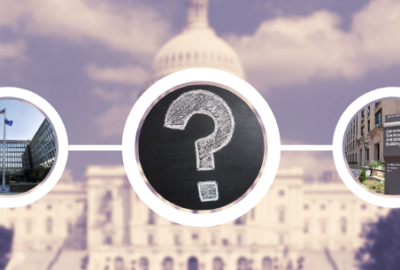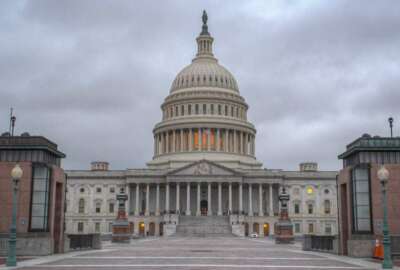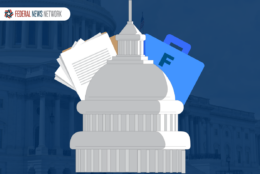
Federal employees score new shutdown protections, relocation tax relief with NDAA
Twelve weeks of paid parental leave is the main attraction in the House-passed defense authorization bill, but it has a lot more for civilian federal employees.
Best listening experience is on Chrome, Firefox or Safari. Subscribe to Federal Drive’s daily audio interviews on Apple Podcasts or PodcastOne.
The House on Wednesday overwhelmingly passed the annual defense authorization bill, a sweeping piece of must-past legislation that includes some 1,377 provisions.
A new paid parental leave program is among the most consequential of those new provisions in the 2020 National Defense Authorization Act for civilian federal employees.
Lawmakers, employee unions and other organizations have all called the 12 weeks of paid parental leave “historic” and “monumental.” Rep. Don Beyer (D-Va.), a co-sponsor of the original paid leave legislation, called it “one of the biggest victories for the federal workforce in my lifetime.”
But the 2020 National Defense Authorization Act conference report is packed with several policies that will have an impact — though perhaps a smaller one — on the civilian federal workfoce.
Read more about the federal paid parental leave program here. And read more about Congress’ plans for the Office of Personnel Management-General Services Administration merger here.
A roundup of several other notable provisions is below.
Related Stories
Amelia Brust/Federal News Network
Congress to formally block OPM-GSA merger with defense authorization bill
OPM Reorganization
Read more
New shutdown protections for feds
Related Stories

Congress to formally block OPM-GSA merger with defense authorization bill
The defense policy bill includes two new safeguards designed to protect federal employees and their health, dental, vision and life insurance benefits during the next government shutdown.
First, the NDAA conference report would designate certain services under the Federal Employees Health Benefits Program (FEHBP) and Federal Employees Group Life Insurance (FEGLI) program as “excepted” under the Antideficiency Act.
Specifically, the bill would ensure federal employees who experience a qualifying life event, such as the birth or adoption of a child, can immediately enroll their dependents into the FEHBP even during a government shutdown.
Some agencies weren’t able to process new dependents during the previous 35-day government shutdown because the employees who would otherwise enroll new dependents were, in some cases, furloughed. This bill explicitly designates employees who perform this work as “excepted” during future government shutdowns.
Similar protections would apply to the federal dental, vision and long term care programs. The NDAA clarifies employees’ coverage under these programs will not end and can’t be canceled during future shutdowns.
In general, coverage under federal dental, vision and long-term care insurance plans will continue during government shutdowns, but if the lapse goes on for two consecutive pay periods, these programs would begin to directly bill their enrollees for missing premiums.
During the last government shutdown, OPM extended the number of consecutive pay periods enrollees in FEDVIP would have to miss before they received bills for missing premiums from two to three. But this legislation would prevent those scenarios from happening altogether.
The NDAA also requires the OPM director to set new regulations describing how federal employees impacted by future government shutdowns could simply repay missed premiums through back pay.
Federal employees are guaranteed back pay during all future shutdowns through the Government Employee Fair Treatment Act, which President Donald Trump signed into law back in January.
A bipartisan, bicameral group of lawmakers had introduced these shutdown protections as standalone bills back in April.
Policy tweak for intern hiring help
This year’s NDAA also makes a seemingly small fix to provisions included in last year’s defense authorization bill, which gave agencies expedited authority to hire college graduates and post-secondary students.
It addresses what senators and the Office of Personnel Management have described as an unintended consequence of the 2019 authorization act, which capped the number of students agencies could hire under this authority to 15% of the number of students hired into the competitive service last year.
The 2019 provisions were touted as a win for agencies, who have been struggling to inject more youth into their talent pipelines for years.
But few students actually receive jobs through the competitive service, meaning some agencies may not be able to hire any students to permanent positions.
The NDAA language eliminates mention of the competitive service, meaning agencies would be free to recruit recent college graduates simply based on the number of students hired during the previous fiscal year.
OPM had proposed this solution in a series of legislative proposals given to congressional leaders back in April. A bipartisan group of senators on the Homeland Security and Governmental Affairs Committee had introduced a similar, standalone bill earlier this year.
Relief for relocating feds
The Senate version includes legislative text that would provide relief to federal employees who may have to relocate for work.
Specifically, it ensures federal employees who need to move for work and qualify to have their agencies reimburse them for moving expenses are also repaid for any taxes owed on those reimbursements.
The Tax Cuts and Jobs Act, which Congress passed in 2017, eliminated the deduction federal employees could previously take to alleviate the costs of relocating and moving their household items. Those moving reimbursements were being taxed as ordinary income, and agencies were compelled to have their employees foot the bill.
The provision came from Sen. Mark Warner (D-Va.), who has proposed similar standalone legislation on multiple occasions.
Probationary period review
Congress has also asked the Defense Department to review its policies on two-year probationary periods for civilian employees, a study that could prove to be consequential for future changes on this topic across the federal government.
This DoD review is significant, as a few civilian agencies, OPM, members of Congress and some federal employee groups have advocated for longer probationary periods across government.
Latest Workforce News
But federal unions have criticized the two-year trial period, as employees don’t have full due process rights under a probationary period.
Currently, most federal employees have one year after their initial hire date to demonstrate their skills and abilities on the job.
“Groups like SEA will finally receive insight into how an extended probationary period impacts employee onboarding and supervision,” Bill Valdez, president of the Senior Executives Association, said Wednesday in a statement. “This information will greatly improve our ability to lead and manage the federal workforce.”
The Professional Managers Association, which has said some government positions require so much training that a year simply isn’t long enough to evaluate employees’ skills and abilities, also praised the DoD review.
“This is of critical importance at the IRS where some managers are forced to make decisions on probationary periods before they have had adequate opportunity to engage with the employee they are reviewing,” Tom Burger, PMA executive director, said in a statement. “Understanding how longer probationary periods impacting the Department of Defense will provide necessary information on potential solutions to this problem.”
Past research from MSPB has found that agencies have rarely used the probationary period to weed out poor managers. Between 1999 and 2016, only about seven for every 1,000 new supervisors faced consequences for failing their probationary period.
Reemployed annuitants
Finally, the NDAA would extend a benefit for reemployed annuitants, which will allow them to continue receiving their full annuity and salary — if rehired by their agencies on a part-time basis.
Reeemployed annuitants receive their Civil Service Retirement System (CSRS) or Federal Employee Retirement System (FERS) annuities and, at the same, a paycheck as a federal employee, which is often offset by the amount of the annuity.
Agencies, however, can waive this salary offset requirement for reemployed annuitants. OPM previously granted dual compensation waivers if an agency had demonstrated it had severe recruiting challenges, a need for emergency hiring, a need to retain a specific individual or some other unusual circumstances.
Congress back in 2010 gave agency heads the authority to grant dual compensation waivers on their own to reeemployed annuitants who work about 20 hours a week.
That authority was due to expire at the end of the year but is extended now through 2024.
“The authority providing agency leaders with the option to rehire federal retirees without an offset to their annuities has been proven to be a valuable tool in the government’s efforts to mitigate the loss of federal employees while filling critical gaps and training the next generation of federal managers,” Ken Thomas, national president of the National Active and Retired Federal Employees (NARFE) Association. “It’s a true win-win for retirees, the government and the American people, and we thank the committees for continuing to see the benefit and value of this measure.”
Copyright © 2025 Federal News Network. All rights reserved. This website is not intended for users located within the European Economic Area.
Nicole Ogrysko is a reporter for Federal News Network focusing on the federal workforce and federal pay and benefits.
Follow @nogryskoWFED








